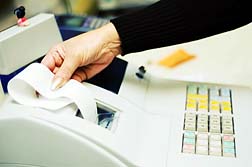 But there's a new frontier: cash register receipts. According to John C. Warner, co-founder of the Babcock Institute for Green Chemistry, the cash receipts that emerge from many modern cash machines contain BPA levels far greater than those leaching from plastic bottles.
But there's a new frontier: cash register receipts. According to John C. Warner, co-founder of the Babcock Institute for Green Chemistry, the cash receipts that emerge from many modern cash machines contain BPA levels far greater than those leaching from plastic bottles.Warner's revelation was profiled in the October 7th edition of ScienceNews. A former employee of Polaroid Corp., Warner was conversant with the chemistry behind some carbonless copy papers—used today for most credit card receipts—and the thermal imaging papers that emerge from most modern cash registers.
Both relied on BPA to work. Warner explained that manufacturers would coat a powdery layer of bisphenol-A onto one side of a piece of paper together with an invisible ink. "Later, when you applied pressure or heat, they would merge together and you'd get color."
Warner went on to become a professor of green chemistry at the University of Massachusetts. It was while he was on campus, about a decade ago when research began to turn up concern about the adverse health effects and risks associated with BPA. And he wondered about all those cash receipts.
So he organized a little field trip for his students, out to stores to collect as many cash register receipts as they could find. After analyzing the papers in the lab, many were found to contain BPA—and according to Warner the amount of BPA those receipts carried is not trivial.
READ MORE BISPHENOL-A LEGAL NEWS
"When people talk about polycarbonate bottles, they talk about nanogram quantities of BPA [leaching out]," Warner observes. "The average cash register receipt that's out there and uses the BPA technology will have 60 to 100 milligrams of free BPA." By free, he explains, it's not bound into a polymer like the bisphenol-A found in polycarbonates. Rather, you're dealing with the individual molecules loose and ready for uptake.Thus, when it comes to BPA in the urban environment, "the biggest exposures, in my opinion, will be these cash register receipts."
They're still out there too, he says. He turned up cash register receipts containing BPA in September. And there is no handy red flag for the consumer to know which receipts contain BPA, and which don't. To the naked eye they all look the same.
Consumers would be wise, to be wary of receipts. Many of us carry them in our wallets, and come in contact with a myriad of them at tax time. For any individual who develops a health problem tied to bisphenol-A, it would be prudent to include a check of cash register receipts on hand, as a suspected source for contamination.




